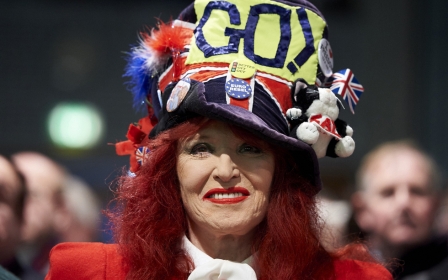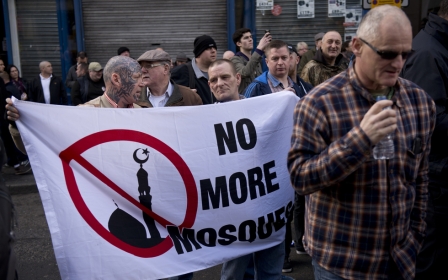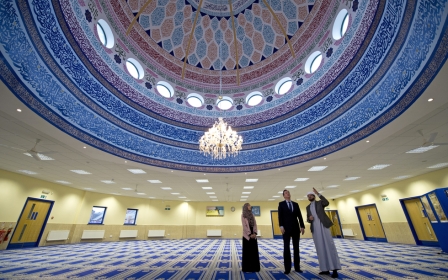Pegida UK: Mainstreaming the far right with mums and prams

When Pegida (Patriotic Europeans against the Islamisation of the West) announced it was launching a UK franchise, many waited with baited breath to see whether the German-born movement could muster the same show of strength in the UK which had provided its namesake’s notoriety. Specifically, it has been the German Pegida’s ability to draw crowds numbering in the tens of thousands which placed the movement squarely in the spotlight, combined with a new form of far right activism which saw a shift from thuggish gangs to the presence of families and women coming together to oppose the so-called “Islamicisation of Europe”.
British punditry was quick to deride the small show of a few hundred people marching through the rain by Birmingham train station on a cold February morning. There has long been a sense of British exceptionalism when it comes to the far right, particularly when compared with other European countries. The French National Front won record numbers of votes and historic firsts in local and regional elections last year and is set to make the second round of the 2017 presidential election. In Greece, one of Europe’s most violent far-right parties, Golden Dawn, came third in the September’s general election, while even more traditionally resilient to fascism Nordic countries, including Finland and Denmark, have seen the growth of the political representation of far-right parties at the polls.
In Britain, the BNP is a largely redundant party, while efforts by other far-right parties, such as Britain First, have failed to garner much public support. Meanwhile UKIP’s Nigel Farage has played on the very same register which has seen the far-right rise to prominence elsewhere, notably a fear of immigrants and a disdain for the EU.
Present at the demonstration in Birmingham last month was former founder of the English Defence League, Tommy Robinson, a man who describes the refugee crisis as “a Muslim invasion of Europe” and expressed to me his hope that Pegida UK would see “families with buggies”, coming out to show their support for the cause. In this statement lies the very crux of Robinson’s chameleon like metamorphosis from head of the EDL, associated with racist thuggery, through to absolved reformer (via the apparently not all that successful efforts of the “anti-extremist” Quilliam Foundation) through to figurehead of the revamped attempt at a socially acceptable conduit for populist vitriol. And in this image of domesticated fascists accompanied by the next generation of European nativists in prams, is the essence of Pegida’s dangerous appeal. A sense that if "normal" people – not violent thugs or hooligans, but mothers and innocent children - can express such concerns they must indeed be true.
Hassan Guedioura, a PhD researcher at Paris 8 university and Universidad Autonoma de Madrid explains that far right movements ultimately seek victory through the polls and for this, they need to mainstream their ideas. In France, this has been illustrated by Marine Le Pen’s campaign of “dediabolisation” – literally, "de-demonisation", aimed at distancing her party from her father’s legacy of antisemitism and racism, by exploiting more socially acceptable forms of hatred, namely against immigrants and Muslims.
The refugee crisis has providing a convenient focal point for the very anxieties far-right groups seek to play on. After all, the idea of Europe being overwhelmed by dangerous outsiders plays on the darkest unconscious prejudice of the human mind, with the symbolic "outsider" replaced at varying points in history by different figures, from Catholics, to Jews, Roma, Poles and Muslims. The current crisis provides a useful illustration of far-right paranoia, feeding into a constructed narrative about Europe’s "invasion" and offering simplistic explanations to complex problems.
Pegida UK may appear to have failed to achieve the mass support it hoped its launch would muster. But the success of the far-right can be measured in many ways.
Certainly demonstrations and results at the polls are an obvious indicator of a show of force and evidence often of a failure of other mainstream parties to provide coherent solutions to the problems facing the citizenry. But the far right’s success could also be measured through its ability to set the terms of public discussions on a given topic.
It might, for example, be assessed by the verbal slippage by which terms that might have previously been restricted to fascists make their way into the mainstream. The use of pest-like analogies for example, whereby columnists in the most widely read publication in the country refer to refugees as “cockroaches”, or the prime minister himself, David Cameron, borrowing from the same lexicon in referring to refuges as a “swarm”.
It might also be evident in the type of legislation being proposed to deal with the so-called "other". Just this month, the British Home Secretary Theresa May announced plans to strip criminals with dual nationality of their British citizenship, in response to recent cases of sexual abuse by – in some cases – predominantly Asian gangs.
The announcement was reported in headlines such as “Asian sex abusers to be stripped of UK citizenship and deported”, reinforcing the far-right frame of brown sexuality preying on white women and failing to highlight significantly the fact of criminal networks of sexual exploitation which prey on vulnerable women.
Across Europe, exclusivist and constructed concepts previously relegated to the margins such as the concept of a “Judeo-Christian” civilization, a term offered pseudo academic cover by right-wing thinkers like Bernard Lewis, have found their way into the manifestos of violent nativist fanatics like Anders Breivik, responsible for the murder of 77 people in Norway in 2011, but perhaps even more worryingly, they’ve also found echo in the speeches of anointed Christian figures, such as Bishop Lord Nazir-Ali.
Other ideas including the notion of demographic threat allegedly posed by Muslim birth-rates – an idea sensationally paraded by a British broadsheet as well as by commentators "warning" that “by the year 2050, Britain will be a majority Muslim nation”, have become increasingly common currency.
Recently, the penennial cliché of marauding hordes of dark-skinned men threatening white European women was reignited via salacious headlines, when it emerged that women in Cologne had been sexually molested during New Year’s celebration.
Upon investigation, it emerged that in fact, only three of the 58 suspects arrested in connection with the attacks in Cologne were refugees from Iraq or Syria. But the damage by this point was done and the far-right’s narrative granted ever more credibility. The story had become a symbolic illustration of the alleged existential threat refugees are said to pose to European culture, in which white blonde women are cast as the walking vessels of a threatened European glory. And the facts cannot undo that.
As Guedioura points out, it is too early to tell whether Pegida UK will match the success of its Germanic brethren. But the force and reach of its ideas shouldn’t be assumed to be limited to its numeric weight at rainy demos. Rather, the success of Pegida UK or the EDL or the myriad groups united by hate and often little else, should be premised on the extent to which far-right frames of understanding seep into mainstream parties and the media. In this, they may already be winning.
- Myriam Francois is a Franco-British journalist, broadcaster and writer with a focus on current affairs, France and the Middle East. You can follow her on Twitter @MyriamFrancoisC
The views expressed in this article belong to the author and do not necessarily reflect the editorial policy of Middle East Eye.
A protester gives a raised fist salute during a demonstration by the UK branch of the German group 'Pegida' in the city centre of Newcastle upon Tyne, Northern England on 28 February, 2015 (AFP).
Middle East Eye propose une couverture et une analyse indépendantes et incomparables du Moyen-Orient, de l’Afrique du Nord et d’autres régions du monde. Pour en savoir plus sur la reprise de ce contenu et les frais qui s’appliquent, veuillez remplir ce formulaire [en anglais]. Pour en savoir plus sur MEE, cliquez ici [en anglais].





